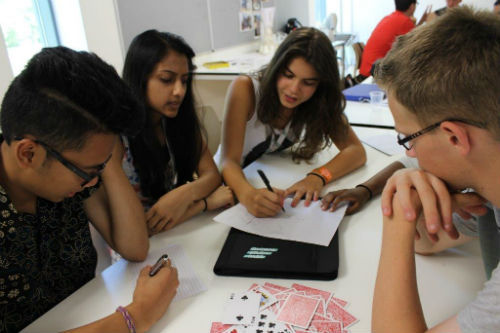
"This study demonstrates that meaningful measures of quality can be determined for many countries and that these would provide clear goals for educational development." -- Eric Hanushek
Quality is more important than quantity, according to a recent OECD report published by the World Bank on Universal Basic Skills. The report shows how meeting basic PISA learning goals begets economic growth. 76 countries were studied. Based on the report, it's clear that schools worldwide should strive to meet those basic goals. The report does a projective forecast, which suggests that improving quality is far more beneficial than increasing enrollment at the current quality level. In the lowest-income countries, the economic gains from achieving universal basic skills would average more than eight times their current GDP. So how can we work to boost the level of learned skills in the classroom?
I talked with Eric A. Hanushek (Paul and Jean Hanna Senior Fellow at the Hoover Institution of Stanford University) and Andreas Schleicher (Director for Education and Skills, and Special Advisor on Education Policy to the Secretary-General at the OECD) about the recent report.

"The economic output that is lost because of poor education policies and practices leaves many countries in what amounts to a permanent state of economic recession - and one that can be larger and deeper than the one that resulted from the financial crisis at the beginning of the millennium, out of which many countries are still struggling to climb." -- Andreas Schleicher
Andreas, what did you find most surprising in this report?
Of course, everyone knows that education is important, but the magnitude of the economic rewards to better skills is simply stunning. Think about it, just ensuring that every student in the industrialized world obtains very basic skills would generate more wealth than the total amount we currently spend on education. Or, put the other way around, the economic output that is lost because of poor education policies and practices leaves many countries in what amounts to a permanent state of economic recession - and one that can be larger and deeper than the one that resulted from the financial crisis at the beginning of the millennium, out of which many countries are still struggling to climb.
Do you think governments and school systems will fight the idea that improving quality is more beneficial than increasing enrollment?
I think everyone understands that schooling makes sense only if students learn something. Getting students into schools is a start, but then schools need to ensure that students acquire a solid foundation of knowledge in key disciplines, that they develop creative, critical thinking and collaborative skills, and that they build character attributes, such as mindfulness, curiosity, courage and resilience. If teachers and schools get the right support to achieve this, they will be supportive. That's surely one lesson we can learn from the most rapidly improving school systems.

"Schools need to ensure that students acquire a solid foundation of knowledge in key disciplines, that they develop creative, critical thinking and collaborative skills, and that they build character attributes, such as mindfulness, curiosity, courage and resilience." -- Andreas Schleicher
Is there an issue of equity here as well - the trade off between increasing quality for some versus improving access for all?
That is a false choice. What the most successful education systems show us is that we can give every student access to excellent teaching and reconcile quality with equity. And it is encouraging that, at least in the industrialized world, this is not primarily a question of money but rather a question of smart spending choices and effective policies and practices. In fact, the world is no longer divided between rich and well-educated countries and poor and badly-educated ones. High quality education is getting in reach for many low and middle-income countries.
A great strength of attaining universal basic skills is also the contribution this would make to a more inclusive economy, and that is another important equity consideration. As the report shows, universal basic skills in school will have a complementary impact on reducing gaps in earnings that filter into smaller income differences. And it has this impact while also expanding the size of the economy. In this sense, it differs from simple tax and redistribution schemes that might change the income distribution but do not add to societal output. Thus, more inclusive growth made possible through universal achievement of basic skills has tremendous potential to ensure that the benefits of economic development are shared more equitably among citizens.

"Chinese parents and grandparents tend to invest their last renminbi into the education of their children, their future. In much of Europe and North America, governments have started to borrow the money of their children to finance their consumption today and the debt they have incurred puts a massive break on economic and social progress." -- Andreas Schleicher
Can you give us a sense of what the key focus points for improving quality of a school should be in the lowest income countries. Is there an argument that class size reduction would have a benefit greater than increasing enrollment?
Wherever you have to make a choice between smaller classes and better teaching, go for the latter. Nowhere does the quality of a school system exceed the quality of its teachers. Top school systems pay attention to how they select and train their staff. They attract the right talent and they watch how they improve the performance of teachers who are struggling. They also provide intelligent pathways for teachers to grow in their careers.
High performers have also moved on from industrial to professional forms of work organization in their schools. They encourage their teachers to use innovative pedagogies, to improve their own performance and that of their colleagues, and to work together to define good practice. They grow and distribute leadership throughout the school system. Perhaps the most impressive outcome of world-class school systems is that they deliver high quality across the entire school system so that every student benefits from excellent teaching. School systems as diverse as those in Finland and Shanghai attract the strongest principals to the toughest schools and the most talented teachers to the most challenging classrooms.
But there is more we can learn from the world's education leaders. An important lesson is that the leaders in high-performing school systems seem to have convinced their citizens to make choices that value education more than other things. Chinese parents and grandparents tend to invest their last renminbi into the education of their children, their future. In much of Europe and North America, governments have started to borrow the money of their children to finance their consumption today and the debt they have incurred puts a massive break on economic and social progress.
Eric, how significant do you think the impetus of this study will be for more governments and school systems to work towards the goal of meeting the standards of PISA's universal basic skills?
This study demonstrates that meaningful measures of quality can be determined for many countries and that these would provide clear goals for educational development. In the past, countries have responded strongly to school access goals, but they have not paid sufficient attention to the quality of schools. The study shows that improving quality to the basic level required in our information-based world has economic benefits that are multiple times the benefits of simple school expansion at low quality. The stark reality of the economic implications of quality schooling will hopefully lead all nations of the world -- both rich and poor -- to focus more on the skills that students obtain in school.
(All Photos are courtesy of Global Study Pass)
Join me and globally renowned thought leaders including Sir Michael Barber (UK), Dr. Michael Block (U.S.), Dr. Leon Botstein (U.S.), Professor Clay Christensen (U.S.), Dr. Linda Darling-Hammond (U.S.), Dr. MadhavChavan (India), Professor Michael Fullan (Canada), Professor Howard Gardner (U.S.), Professor Andy Hargreaves (U.S.), Professor Yvonne Hellman (The Netherlands), Professor Kristin Helstad (Norway), Jean Hendrickson (U.S.), Professor Rose Hipkins (New Zealand), Professor Cornelia Hoogland (Canada), Honourable Jeff Johnson (Canada), Mme. Chantal Kaufmann (Belgium), Dr. EijaKauppinen (Finland), State Secretary TapioKosunen (Finland), Professor Dominique Lafontaine (Belgium), Professor Hugh Lauder (UK), Lord Ken Macdonald (UK), Professor Geoff Masters (Australia), Professor Barry McGaw (Australia), Shiv Nadar (India), Professor R. Natarajan (India), Dr. Pak Tee Ng (Singapore), Dr. Denise Pope (US), Sridhar Rajagopalan (India), Dr. Diane Ravitch (U.S.), Richard Wilson Riley (U.S.), Sir Ken Robinson (UK), Professor Pasi Sahlberg (Finland), Professor Manabu Sato (Japan), Andreas Schleicher (PISA, OECD), Dr. Anthony Seldon (UK), Dr. David Shaffer (U.S.), Dr. Kirsten Sivesind (Norway), Chancellor Stephen Spahn (U.S.), Yves Theze (LyceeFrancais U.S.), Professor Charles Ungerleider (Canada), Professor Tony Wagner (U.S.), Sir David Watson (UK), Professor Dylan Wiliam (UK), Dr. Mark Wormald (UK), Professor Theo Wubbels (The Netherlands), Professor Michael Young (UK), and Professor Minxuan Zhang (China) as they explore the big picture education questions that all nations face today.
The Global Search for Education Community Page
C. M. Rubin is the author of two widely read online series for which she received a 2011 Upton Sinclair award, "The Global Search for Education" and "How Will We Read?" She is also the author of three bestselling books, including The Real Alice in Wonderland, is the publisher of CMRubinWorld, and is a Disruptor Foundation Fellow.

